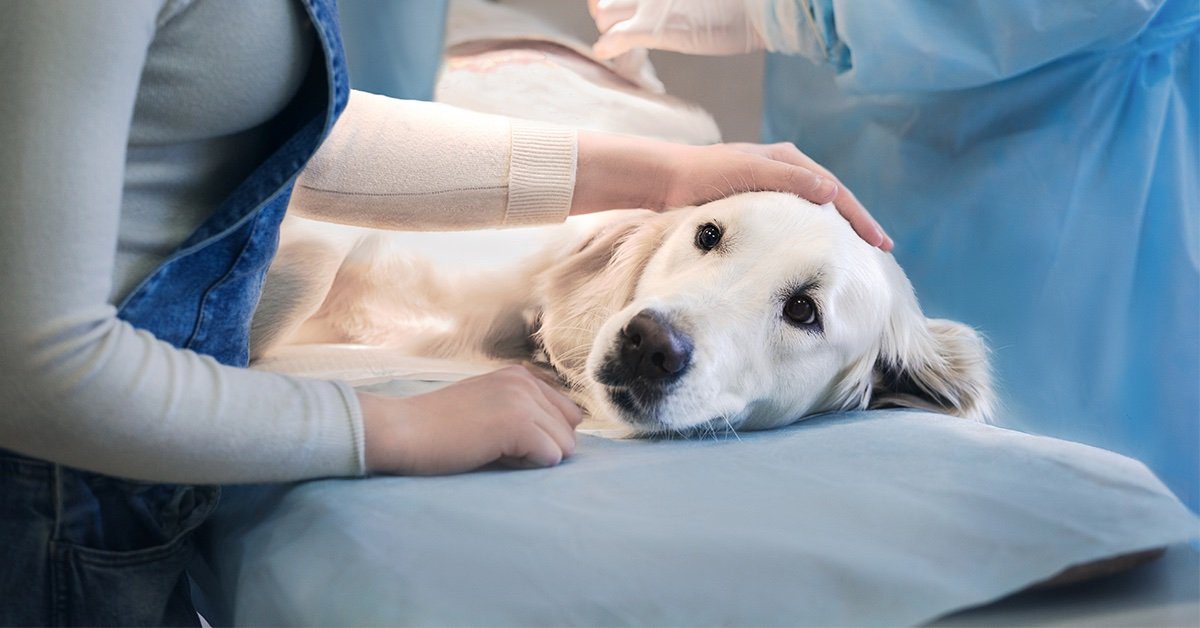No matter how diligently pet owners plan ahead for their pet’s care, sometimes a serious accident or illness can come out of left field. It could be that your dog decided to turn a stuffed toy into their evening snack, or your cat took a big leap and didn’t land on their feet.
Surgery may be the last word you want to hear associated with your pet, but it can often be the best way to help your pet recover from an accident or illness, to better their quality of life, or even to save their life.
Surgery can be scary and stressful, and even if it hasn’t happened to you yet (we hope it never will!), you may be wondering if your pet insurance policy will cover this unforeseen expense. It’s vital that you know your coverage options, so we’re answering your questions surrounding pet insurance coverage for surgery – and what types of surgical procedures it may cover for your pup or kitty.
Does My Pet’s Insurance Plan Cover Surgery?
The good news is, many pet insurance plans, including Pumpkin plans, do cover surgeries if they’re prescribed to treat eligible accidents, injuries, or illnesses, and they’re otherwise eligible for coverage. It pays to choose a pet insurance plan that offers extensive accident & illness coverage including a variety of treatment options needed to help your pet get better, which includes surgery and even prescribed medication to help pain management during recovery.
It sounds alarming, but depending on the accident or illness, surgery may be the most effective treatment. Let’s go back to our stuffed toy example. Imagine your dog ate a stuffed toy – it’s likely that the fabric will unravel and cause some major stomach problems. In this instance, your vet may recommend a foreign object removal surgery as soon as possible. Sometimes, surgery may also be needed for all-too-common dental illnesses like gum disease – some pet insurance plans (like Pumpkin plans!) may offer coverage for this, too.
It’s hard to list out every single potentially covered surgery in a pet insurance plan, so it’s a good idea to consult your pet insurance policy for specifics. If the question, “What does pet insurance cover?” ever crosses your mind, you can always refer back to your plan or a rep from your provider for help.
The surgery being a treatment for an eligible condition is an important point to remember. To compare, surgery may be covered to treat an eligible orthopedic accident like hip dysplasia, or a sudden injury like a broken leg, but may not be covered for cosmetic surgery like tail docking, or any surgery that’s elective (chosen by you, not the vet, and is not medically necessary).
Does pet insurance cover surgery for cancer?
Accident & illness coverage differs based on the pet insurance plan, however, we can speak to Pumpkin plan coverage. Pumpkin plans do cover cancer and cover eligible surgeries as a treatment for cancer. Pumpkin plans also cover other types of eligible cancer treatments including chemotherapy and radiation treatment.
Does pet insurance cover surgery for hereditary conditions or congenital conditions?
Hereditary conditions, sometimes called genetic diseases, are those that are inherited by a pet from their parents. On the other hand, congenital conditions are those that are present at birth such as heart defects. While not all pet insurance plans include coverage for these accidents or illnesses, Pumpkin plans cover eligible surgeries as a treatment for covered hereditary or congenital accidents and illnesses.
Bear in mind that some pet insurance plans only include coverage for hereditary or congenital conditions if you purchase an add-on for an additional fee. Pumpkin Pet Insurance plans include coverage for hereditary and congenital accidents and illnesses for no additional add-on fee.
Does pet insurance cover surgery for routine wellness care?
It’s highly unlikely that surgery would be recommended as a routine procedure or for wellness care. With any surgery, there is always the risk of complication, so veterinarians often won’t recommend surgery unless they feel it’s absolutely necessary. In any case, most standard accident & illness pet insurance plans would not cover any claims related to wellness care.
What treatments besides surgery does pet insurance cover?
Veterinary medicine has advanced leaps and bounds in recent years, so today our pets have access to more advanced veterinary care than ever before. Aside from surgery, there are many incredible treatment options for accidents & illnesses that are eligible for many pet insurance plans to cover such as:
- Diagnostic testing and lab exams (like blood tests, X-rays, MRIs, or ultrasounds)
- Advanced care like chemotherapy and stem cell therapy
- Prescription medication, supplements, and even food for covered conditions
- Rehabilitation therapies including alternative therapies like acupuncture, hydrotherapy, and chiropractic
Are there any requirements, conditions, or limits of surgery coverage I should know about?
Your pet insurance plan will likely not cover surgeries if they aren’t prescribed as treatment for an accident or illness by your vet. They also won’t cover surgeries for excluded conditions in your pet insurance policy.
Some common exclusions for surgery coverage include:
- Pre-existing conditions: Pre-existing conditions are conditions that have been diagnosed or show symptoms before your coverage begins or during a waiting period.
- Elective surgeries: These are surgeries that a pet parent may choose to get, but are not related to an accident or illness.
- Spay and neuter procedures: While vets recommend pets get spayed or neutered for health reasons, it’s considered a preventive care procedure as well as an elective procedure, so many pet insurance plans don’t cover it.
- Cosmetic surgeries: Cosmetic surgery aims to improve a pet’s look and function, whether that’s something like wrinkle removal or tail docking. These procedures provide little or no health benefit for a pet, and so do not qualify for pet insurance coverage.
How does pet insurance help cover surgery costs?
Surgery can be an expensive health care cost, particularly for more serious surgeries. As an example, PetMD estimates that surgery to treat hip dysplasia (a common condition in larger dog breeds) can cost anywhere from $1,500-$7,000.
Some pet insurance plans can help you pay for costly surgery for unexpected accidents & illnesses by reimbursing you for a portion of your pet’s eligible care costs. Reimbursement rates will vary from plan to plan. With Pumpkin plans, all pet parents have the option to get 90% cash back on all eligible vet bills.
So how does that work in real life? Let’s take a look at a real-life example*

“My puppy, Nala, caught a bad strain of kennel cough that turned into a serious case of broncho-pneumonia. One night, she started shaking and refusing to eat, so I rushed her to the emergency vet. Due to her high fever, our vet recommended she stay in the hospital for supportive care. Over just 4 short months, our vet bills for diagnosis and treatment of both conditions cost $9,815 – but luckily, my Pumpkin Pet Insurance plan reimbursed me for $8,565! Thanks to Pumpkin, Nala was able to get the care that she needed and made a full recovery.”
Final thoughts on surgery coverage
Any time your pet has an emergency accident or illness that requires surgery, it’s going to be stressful. However, if you have the right pet insurance plan, it’s reassuring to know you have coverage and that your pet has help getting the best care possible when they need it the most. Plus, having a pet insurance plan with coverage for eligible surgeries could even save you hundreds, if not thousands, of dollars over your pet’s life.
The best pet insurance plan is one that puts your pet’s needs front and center. Whether you’re a proud cat parent or a dog’s best friend, your pet deserves a long, healthy life with you. That’s why Pumpkin Dog Insurance plans help you afford accident & illness care with 80–90% cash back on eligible vet bills, so you have help fulfilling your pet’s needs and finding peace of mind. Get a quote and take your first step towards enrolling in pet insurance today!
DISCLOSURE




